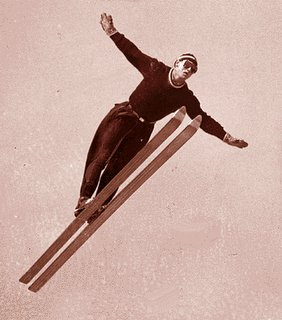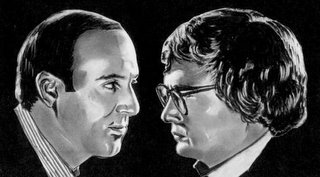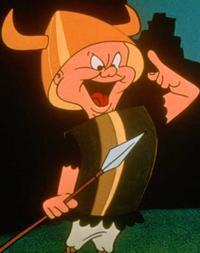Winter Olympics

I love the Winter Olympics. God help me, but I love 'em.
I know it's popular right now to disdain them. Jim Rome (who openly hates them (and who (not coincidentally) is a sneering idiot)) says that it's impossible to follow sports we don't care about, played by athletes we've never heard of....and all that compounded by the 10 hour(ish) tape delay from Italy. I see that American Idol (that paeon to all that is selfish and ego-driven and mean about America) is smoking the Olympics in the ratings.
I've heard others say their only interest in the Olympics is in the medal count -- how the U.S.A. is doing in gold and silver -- and since we traditionally don't do that well in the winter sports, there's no reason to watch.
I get their point; I do. But they're wrong, all of 'em.
What the Olympics offer -- far more than any other sporting event -- is the opportunity to witness rare and stunning dedication and courage. I think of Kerry Strug, doing her last vault with a broken leg and sticking the landing to lead her team to the gold medal. She had to be carried off the mat, but she stuck her landing. Kerry's vault may be the most inspirational and amazing sports memory I have. I think of Zhang Dan -- the chinese skater who crashed spectacularly during her pairs event (looked to me, when she went down, like she broke both knees) -- getting back on the ice, nailing her jumps, and earning the silver medal.
Contrary to popular belief, the Olympics is not about jingoistically cheering for Americans above all else; it's not about counting medals. Don't get me wrong -- I always want the American team to do well, and sure, I root for 'em. But that's not why I watch. I watch to see the athletes reaching heights that can only be imagined by most of us. Heck, reaching heights that (in most cases) were only imagined by the athletes themselves.
These are athletes that, most of 'em, won't earn in a lifetime what a mediocre baseball player will earn this year; yet they train and focus with a dedication that would shame most of the finest pro athletes that ever played.
The Olympics matter, current snideness aside. Do you think Tonya Harding would have whacked the Kerrigan chick over any other figure skating event? This is the Olympics, and they matter.
No, I don't get curling. No, I can't discern the difference between the fastest bobsledders and the slowest...but I can see the joyous elation on the face of a bobsledder when he learns that he has vaulted into the lead by one-hundredth of a second.
This is sports. This is what sports is. It's competition for the joy of it; it's competition that drives you to be far more than you ever thought you could be, far more than most humans can ever be. This is drama, and inspiration, and I love it.







